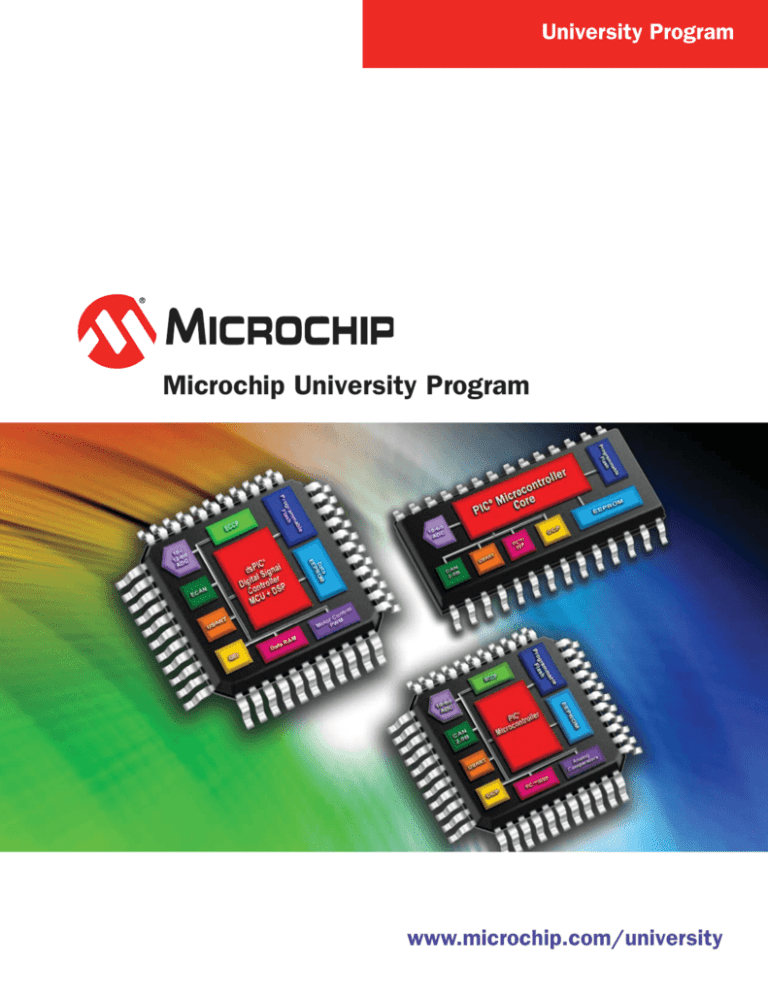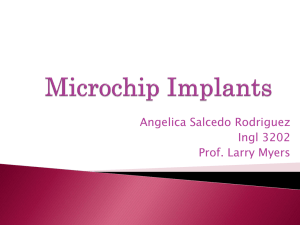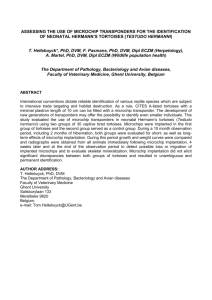
University Program
Microchip University Program
www.microchip.com/university
www.microchip.com/university
THE MICROCHIP
ADVANTAGE
MICROCHIP’S
UNIVERSITY PROGRAM
As a leading provider of microcontroller and analog
semiconductors, Microchip provides solutions
for a wide range of 8- and 16-bit microcontroller
needs. With more than 290 microcontrollers in
our product portfolio, Microchip’s proprietary
PIC® microcontrollers have quickly become a
worldwide standard with more than four billion
devices shipped and more than 400,000
development systems delivered since 1990.
Microchip is recognized as the #1 supplier of
8-bit microcontrollers, based on worldwide unit
shipments.*
The Microchip University Program
assists professors and students
in their efforts to incorporate
Microchip’s PIC® microcontrollers,
dsPIC® digital signal controllers,
analog semiconductors, serial
EEPROMs and the patented
KEELOQ® security devices in their courses/projects.
Microchip Products are Especially
Relevant for Academic Use
■
■
■
■
■
Diverse product line
Full range of development tools
Endless application ideas
Quality technical support
Easy to learn and use products – an excellent
architecture for beginning, intermediate and
advanced students
■ Leading provider of microcontroller and analog
semiconductors
■ Reference material on www.microchip.com
Low-Risk Product Development
■ Seamless program size expansion
■ Pin compatibility for drop-in replacements
■ No need to re-write code
Developing curriculum on the PIC microcontroller
architecture and using Microchip products in the
classroom helps ensure that students are well prepared
for their engineering careers.
Adding topics on Microchip products to your current
course plan is a simple process – one designed to
benefit students and instructors alike. Offering courses
or content on the PIC microcontroller architecture draws
students to schools and universities – it is a widely
accepted and leading edge architecture. This interaction
can help students quickly grasp industry techniques and
methods used to address a fast changing and highly
competitive workplace, further reinforcing their own
academic and professional growth.
The Microchip University Program Provides:
■ Diverse products for classroom use
Faster Time to Market
■ Seamless migration path
■ Add higher memory options and analog peripherals
without losing software investment
■ Curriculum support – whole course solution
Lower Total System Cost
■ Publication and technical support
■
■
■
■
■ Discounts on Microchip development systems
Broad product portfolio
Integration of analog and digital peripherals
Minimize component count
Lower total system cost with increased reliability
Common Development Tools Work with
Microchip’s Whole Portfolio of Products
■ Regional training centers
16-bit PIC®
Microcontrollers
8-bit PIC®
Microcontrollers
®
Deve
oo
ent T
re
ftwa
d So
ls an
AB
m
■ Suite of programming development tools/demo
boards
■ Support of special university development and design
projects
dsPIC®
Digital Signal
Controllers
Com
■ Free student edition software
■ Free samples
Analog, Interface
and Memory
Products
PL
on M
■ Course creation reference material
lopm
*Gartner Dataquest, 2003 Microcontroller Market Share & Unit Shipments,
Tom Starnes, June 2003
■ University program web site: www.microchip.com/
university
8-bit PIC® Microcontroller Product Architectures
Microchip’s 8- and 16-bit Solutions
Microchip’s 8-bit PIC microcontrollers fall into three product architecture
categories providing a variety of options for any application.
Baseline 8-bit Architecture
The Baseline Architecture includes the PIC10F family and portions of the
PIC12 and PIC16 families. These devices utilize a 12-bit program word
architecture with 6- to 28-pin package options. The concisely defined feature
set of the Baseline Architecture enables the most cost-effective product
solutions. A range of low operating voltages makes this architecture ideal for
battery-operated applications.
Mid-Range 8-bit Architecture
The Mid-Range Architecture includes members of the PIC12 and PIC16
families that feature a 14-bit program word architecture. These families are
available with 8- to 64-pin package options. PIC microcontrollers featuring
Microchip’s Mid-Range 14-bit program word architecture are available in
higher pin count packages with Flash and OTP program memory options.
Analog and Interface Products
High Performance 8-bit Architecture
Microchip’s High Performance Architecture encompasses the PIC18
family of devices. These microcontrollers utilize a 16-bit program word
architecture with 18- to 80-pin package options. The PIC18 devices are
high performance microcontrollers with integrated A/D converters and an
advanced RISC architecture that supports Flash and OTP devices. The PIC18
family has special features to reduce external components, thus minimizing
cost, enhancing system reliability and reducing power consumption. The
PIC18 family builds on the foundation established by the other 8-bit PIC
microcontrollers and provides engineers with a smooth, easy migration to
these higher levels of performance and feature sets.
Microchip offers a family of analog and
interface products that complement our broad
microcontroller product lines.
16-bit PIC® Microcontrollers and
dsPIC® Digital Signal Controllers
Battery Management
Li-Ion/Li-Polymer Battery Chargers and Smart
Battery Managers.
As embedded applications grow in complexity with increasing performance
requirements, Microchip has introduced more than 70 new 16-bit devices and
continues to introduce more. The PIC24F and PIC24H 16-bit microcontroller
families enable an easy migration from the 8-bit PIC microcontrollers, with
higher performance, more memory and faster peripherals. This migration
path continues with the dsPIC digital signal controllers, including the
dsPIC30 and dsPIC33 families. These 16-bit solutions have compatible
software, development tools and many of the devices have shared pin-outs
and peripherals. Microchip is a leader in 16-bit performance and C code
efficiency.
16-bit Solutions
One Architecture: Three Compatible Families
16-bit data, 24-bit wide instructions
Same instruction set (DSP features not in PIC24)
Same C compiler and software tools
Same Hardware tools
dsPIC30F
Compatible peripherals
■ 30 MIPS @5V
Compatible pinouts
■ 2.5 to 5.5V operation
■ -40° to 85°C and -40° to 125°C
■ Up to 144 KB Program Flash
■ Integrated Data EEPROM
■ Up to 8 KB RAM
■ 18- to 80-pin packages
PIC24
■
■
■
■
■
■
■
16 and 40 MIPS version @3.3V
3.0 to 3.6V operation
-40° to 85°C (-40° to 125°C planned)
Up to 256 KB Program Flash
Data EEPROM emulation in Program Flash
Up to 16 KB RAM
28- to 100-pin packages
dsPIC33F
■ 40 MIPS @3.3V
■ 3.0 to 3.6V operation
■ -40° to 85°C
(extended temp. planned)
■ Up to 256 KB Program Flash
■ Data EEPROM emulation in
Program Flash
■ Up to 30 KB RAM
■ 64- to 100-pin packages
■ 8 channel DMA
Power Management
LDO and Switching Regulators, Charge Pump
DC/DC Converters, Power MOSFET Drivers,
PWM Controllers, System Supervisors, Voltage
Detectors, Voltage References.
Thermal Management
Temperature Sensors, Fan Speed Controllers and
Fan Fault Detectors.
Linear
Op Amps, Programmable Gain Amplifiers,
Comparators and Linear Integrated Devices.
Mixed Signal
A/D Converters, Digital Potentiometers, D/A
Converters, V/F and F/V Converters and Energy
Measurement ICs
Interface Devices
CAN Peripherals, Infrared Peripherals, LIN
Transceivers, Serial Peripherals and Ethernet
Controllers.
Memory Products
Microchip offers one of the broadest lines of
serial EEPROM memory spanning every density
from 128 bit to 1 megabit; high-speed versions
of all three popular serial buses; industry-leading
quality, read/write endurance and data retention;
generous and flexible voltage and temperature
ranges; and tiny, space-saving packages. These
devices are used in virtually any embedded
control design, including consumer audio/video,
telecom, computer/peripheral, appliance,
automotive, industrial and medical applications.
www.microchip.com/university
DIVERSE PRODUCTS FOR CLASSROOM USE
www.microchip.com/university
CURRICULUM SUPPORT – WHOLE COURSE SOLUTION
Microchip actively works with university professors and other experts in
the field to support the development of whole course solutions. These
solutions combine the necessary tools for teaching PIC microcontroller
classes such as textbooks, lab boards, lab exercises and more.
Available Textbooks
Professors and students have access to more than 70 textbooks in nine
languages to support their efforts in learning more about Microchip’s
architectures and product offerings. A book list is available on the
Microchip web site at: www.microchip.com/university. A few examples
are shown below.
Embedded Design with the PIC18F452 Microcontroller
John B. Peatman, Georgia Institute of Technology
SBN: 0-130462-13-6 (Prentice Hall)
This book can be used in a one-semester university
course at the senior level. The book’s focus is to
develop three capabilities in the design process:
to understand and use components, to exploit
powerful algorithmic processes, and to break down
the complexity of an instrument or device so as
to meet its specifications. The first printing of the
book comes complete with the QwikFlash development board, which,
when populated, is used as an example in the book for interfacing the
PIC18F452 to various external components.
123 PIC® Microcontroller Experiments for the Evil Genius
Myke Predko
ISBN: 0-071451-42-0 (McGraw Hill)
This book was developed for Grade 11 (junior) and
Grade 12 (senior) high school students preparing for
post secondary education in engineering, computer
science, mathematics or physical sciences. It
is also appropriate for university students or
technical hobbyists looking for more information on
programming and interfacing PIC microcontrollers
into an application. Each experiment builds on those before it, so
users develop a hands-on, practical understanding of microcontroller
programming. Microchip’s PICkit™ 1 Flash Starter Kit (DV164101) and
the Signal Analysis PICtail™ Daughter Board (AC153120) are used in the
experiments.
Learn Hardware, Firmware and Software Design
O.G. Popa
SBN: 0-973567-8-72 (O.G. Popa)
Learn Hardware, Firmware and Software Design is a
practical, hands-on design project with three parts.
The book was intentionally planned and structured
as a tutorial guide, to help readers gain real
hardware, firmware and software design skills. This
book explains everything step-by-step, in detail and
each new chapter adds gradually to the previously
built modules. Although the book has only 368 pages, it also comes
with over 400 pages of extremely valuable firmware and software source
code.
PIC Microcontroller: An Introduction Software
and Hardware Interfacing
Han-Way Huang
ISBN: 1-401839-67-3
(Delmar Thomson Learning)
This book presents a thorough
introduction to the Microchip
PIC microcontroller family,
including all of the programming
and interfacing for peripheral
functions. A step-by-step
approach to PIC microcontroller assembly language
programming is presented, with tutorials that
demonstrate how to use such inherent development
tools such as the MPLAB® Integrated Development
Environment, PIC18 C compiler, the MPLAB ICD 2
in-circuit debugger and several demo boards.
Microprocessors from Assembly Language
to C Using the PIC18FXX2
Robert R. Reese
ISBN: 1-584503-78-5
(DaVinci Engineering Press)
This book is intended to be
used as a first course in
microprocessors discussing the
PIC18XX2 microcontroller. The
first seven chapters provide an
introduction to assembly language programming
using the PIC18XXX instruction set, with all assembly
language examples set in a C language context.
The remaining eight chapters cover microcontroller
interfacing topics using the PIC18F242, with
all examples written in C to promote maximum
understanding of the hardware topic being studied.
A goal of this book is to prepare students for
advanced courses in embedded systems or computer
architecture.
A Baker’s Dozen - Real Analog Solutions for
Digital Designers
Bonnie Baker
ISBN: 0-750678-19-4 (Newnes)
This is a hands-on designer’s
guide to the most important
topics in analog electronics
-- such as A/D and D/A
conversion, op amps, filters and
integrating analog and digital
systems -- aimed at engineers
whose primary experience/education is in digital.
It will teach such readers how to “think analog” as
well. Special attention is also given to fundamental
topics, such as noise and how to use analog test
and measurement equipment, that are often ignored
in other analog titles.
NOTE: Microchip provides a list of books on the Microchip web site as a convenience. The listing of a book does not imply endorsement by Microchip of the book or the
contents of the book. Microchip makes no warranty as to the accuracy of the information in a book on this list. Books about PIC microcontrollers can be purchased at local
bookstores, or on www.amazon.com.
The Microchip web site, www.microchip.com, contains material
particularly helpful for course and syllabus development.
Resources include:
■ Application Notes
■ Web Seminars
■ Reference Designs
■ Tutorials
■ Tips and Tricks Guides
■ Data Sheets
■ Application Design Centers
■ Reference Manuals
■ Web Forums
■ On-line Discussion Groups
■ Textbooks
■ Lab Exercises
■ Third Party Teaching Tools
On-line Design Resources
www.microchip.com/CAN
www.microchip.com/Ethernet
www.microchip.com/LCD
www.microchip.com/Motor
List of Class Material and Documentation
A wealth of information on PIC microcontroller products and
tools is available to review and download, including: data
sheets, application ideas and reference literature. Key items
that may be helpful include:
■ Low Cost Development Tools Guide, DS51560
■ Development Systems Ordering Guide, DS30177
■ Product Selector Guide, DS00148
■ MPLAB IDE User’s Guide, DS51519
Microchip supports resource conservation, and consequently
offers our technical documentation and literature as
downloads from the Microchip web site. Limited printed
material is available for special purchase at reduced costs
for universities. Requests for printed material sent on school
letterhead will be reviewed for availability. Send to:
University Program Manager
Microchip Technology Inc.
2355 West Chandler Boulevard
Chandler, AZ 85244-6199
Or e-mail requests to: university@microchip.com.
Publication Support
Interested in writing a textbook or technical paper? Microchip
is pleased to support your efforts in using our products in
textbooks, student papers or school projects. Send an
e-mail request to university@microchip.com for guidelines on
proper use of Microchip trademarks, graphic elements and
copyrighted material.
www.microchip.com/USB
ZigBee™
www.microchip.com/ZigBee
On-Line Production Programming
Microchip’s production programming center allows customers
of all sizes to have their programming code applied to their
purchased Microchip parts. To place an order for Microchip
parts with program code:
■ Upload the code
■ Place verification orders
■ Approve the code
■ Apply the code to production orders
Technical Support
A student’s first option for support should always be the
class instructor or professor. In addition, the Microchip
web site is available 24/7 and offers technical information
in many formats. A good source for research is:
www.microchip.com/gettingstarted.
Microchip also offers “Knowledge Base”, a searchable web
site area covering many topics and frequently asked questions.
To access, go to: www.support.microchip.com.
■ No need to register
■ Click on “Search” in Knowledge Base
■ Type in “Key Words”
■ Click on “Search”
■ Review responses
www.microchip.com/university
Course Creation Reference Material
www.microchip.com/university
UNIVERSITY DISCOUNTS ON MICROCHIP
DEVELOPMENT TOOLS
MPLAB® C30 Compiler (Student Edition)
Development Tools
Microchip’s extensive array of development tools,
application libraries, development boards and reference
designs provide the core of the University Program.
These easy-to-use development tools assist teachers and
professors in their efforts to utilize Microchip products
in the classroom and create courses based on the PIC
microcontroller architecture.
A sampling of some of the most popular development tools
selected by universities and students are included here.
For a complete listing of hardware and software tools, visit
www.microchip.com/devtools.
Microchip offers
a discount of
25% off the list
price on Microchip
development
tools to qualified
universities.
microchip
DIRECT
www.microchipdirect.com
■ Contact university@microchip.com and request a
discount coupon to be used on microchipDIRECT.
■ Request the University Discount through a Microchip
distributor. To find a local distributor, visit
www.microchip.com.
Software Tools
MPLAB® IDE
MPLAB Integrated Development Environment (IDE) is a
free Windows® application supporting multiple debugging tools in
a single development platform. The MPLAB IDE supports editing
source files, compiling, downloading to a PIC microcontroller
emulator and simulator tools and debugging using source files,
absolute listing files or machine code.
MPLAB® C18 Compiler (Student Edition)
The MPLAB C18 Compiler is a full-featured ANSI compliant
C compiler for the PIC18 family of 8-bit PIC microcontrollers.
MPLAB C18 is a 32-bit Windows
console application as well as a fully
integrated component of Microchip’s
MPLAB IDE, allowing source level
debugging with the MPLAB ICE
In-Circuit Emulator, the MPLAB ICD 2
In-Circuit Debugger and the MPLAB
SIM simulator.
Projects, compiler switches and
linker customizations can be controlled completely within MPLAB
IDE to provide a full graphical front end for this powerful compiler.
The free Student Edition has all of the features of the full
compiler and libraries. After 60 days, the optimizations related to
procedural abstraction and to the extended instruction set of the
newer PIC18XXXX devices will be disabled. Code compiled after
the expiration date will function, but may occupy more memory
space.
The MPLAB C30 Compiler is a full-featured, ANSI
compliant optimizing compiler. The MPLAB C30 C Compiler
includes a complete ANSI C standard library, including string
manipulation, dynamic memory allocation, data conversion,
timekeeping, DSP and math libraries. The MPLAB C30
C Compiler has a powerful code optimizer; other 16-bit
microcontrollers generate as much as 165 percent larger
code for the same application.
FilterLab® Active Filter Design Software
The FilterLab software is
an innovative software tool that
simplifies active filter design.
Available at no cost, the FilterLab
active filter software design tool
provides full schematic diagrams
of the filter circuit with component
values and displays the frequency
response.
dsPICworks™ Data Analysis and DSP Software
The dsPICworks tool makes it easy to evaluate and
analyze DSP algorithms. A variety of DSP and arithmetic
operations can be run and the data analyzed in both time
and frequency domain. Key features of the dsPICworks Data
Analysis and DSP software include:
■ Visually analyze time and
frequency domain data
■ DSP operations: FFT,
convolution, correlation, DCT
and filtering
■ Waveform synthesis
■ Tool generates one, two and
three-dimensional frequency
graphs
■ Data import/export options to interface with MPLAB IDE
and MPLAB ASM30
■ Support for fractional, integer and IEEE floating point
data in decimal and hexadecimal notation
Digital Filter Design Tool (SW300001)
The Digital Filter Design tool
makes designing and analyzing
FIR and IIR filters easy. Enter
frequency specifications and
filter code and coefficients
are generated automatically.
Graphical output windows
provide the desired filter’s
characteristics.
Digital Filter Design Lite (SW300001-LT)
The Digital Filter Design Lite software package provides a
subset of the functionality in the full version of Digital Filter
Design at a fraction of the cost. The differences between the
two versions lie in the number of supported FIR and IIR taps
and the presence of MATLAB support.
PICkit™ 2 Starter Kit (DV164120)
The PICkit 2 Starter Kit is a low-cost
development tool with an easy-to-use
nterface for programming many of
Microchip’s Baseline, Mid-Range and HighPerformance Flash microcontrollers. The kit
includes everything needed to evaluate and
develop applications and enables users to start writing code and
programming with PIC microcontrollers. Instructions are provided
in a series of 12 lessons with all source code files furnished.
The starter kit also features full-speed USB support and firmware
upgradeability.
Explorer 16 Development Board (DM240001)
The Explorer 16 Development Board is a low
cost, efficient development board to evaluate
the features and performance of Microchip’s
16-bit PIC24 microcontroller and dsPIC33
Digital Signal Controller (DSC) families.
Coupled with the MPLAB ICD 2 In-Circuit
Debugger, real-time emulation and debug facilities speed
evaluation and prototyping of application circuitry.
MPLAB® ICD 2 In-Circuit Debugger/Programmer (DV164005)
SUPPORT OF SPECIAL
UNIVERSITY DEVELOPMENT
AND DESIGN PROJECTS
Learning about Microchip products is not a static process.
Professors and their students have produced innovative
solutions and applications using PIC microcontrollers and
analog products. Microchip supports numerous student
and university projects. To find out more, visit the Microchip
University Corner at: www.microchip.com/university.
Robotics Competitions
Microchip is an Official Supplier of
FIRST (For Inspiration and Recognition
of Science and Technology), donating
microcontrollers and development tools
to more than 1,200 high school teams
worldwide who compete in this highenergy, high-tech robotics competition. Microchip is also the
Organizing Sponsor and Leader in Technology Sponsor for
the FIRST Robotics Competition (FRC) Arizona Regional.
For more information about the FIRST organization, visit their
web site at: www.usfirst.org.
In addition, Microchip supports
hat connects to a PC and the designer’s target
board for direct in-circuit debugging of the target PIC
microcontroller. This tool allows users to download
programs to be executed in real time or single step,
establish watch variables, set break points, complete memory
read/writes and more. The MPLAB ICD 2 can also be used as a
development programmer for the target PIC microcontroller.
PICSTART® Plus Development Programmer (DV003001)
The PICSTART Plus programmer is a low cost flexible design tool
for PIC microcontrollers. It runs under MPLAB IDE and comes
complete with assembler, simulator, programmer and product
samples.
MCP2515 CAN Controller PICtail™ Demonstration Board
(MCP2515DM-PCTL)
This demo board implements a simple CAN bus using two
nodes, one using the MCP2515 Stand Alone CAN Controller and
the other using the MCP25020 CAN I/O Expander. Each node
utilizes one input (push button) and one output (LED). The boards
demonstrate a simple, inexpensive implementation of a CAN bus.
MCP9800 Temperature Sensor PICtail™ Demonstration Board
(MCP9800DM-PCTL)
This board demonstrates how to interface the MCP9800 to a
PIC® microcontroller using the PICkit™ 1 Flash Starter Kit as a
platform. The demo board can also be used as a stand-alone
module to quickly add thermal sensing capability to any existing
application.
SEEVAL® 32 Serial EEPROM Designer’s Kit (DV243002)
SEEVAL 32 is a powerful, easy-to-use tool for serial EEPROMs.
The kit includes a versatile, socketed programmer/reader board
and Windows-based software for reading and writing serial
EEPROMs. The tool provides visual representation of the memory
array on-screen, endurance cycling, and allows data files to
be stored and retrieved from disk. This kit features everything
necessary to quickly develop a robust and reliable serial
EEPROM design and greatly reduce the time required for system
integration and hardware/software debug.
of Robots Creator (ANCR)
in partnership with Anger’s
University Institute of
Technology (IUT) and their
annual competition the French
Robotic Cup E=M6.
Solar Race Car Teams
Microchip supports many of
the solar race car teams for
the America Solar Challenge
for the Formula Sun racing
events. Some of the teams
using Microchip devices
include:
Kansas State University Solar Car Racing Team
Kansas State University - Manhattan, KS
Team PrISUm
Iowa State University - Ames, IA
McMaster Solar Car Project
McMaster University - Hamilton, ON, Canada
Wayne State Formula SAE Racing
Wayne State University - Detroit, MI
Team iSun
McGill University - Montreal, Quebec, Canada
Midnight Sun Solar Race Team
University of Waterloo - Waterloo, ON Canada
www.microchip.com/university
Learning Technology and Hardware Tools
Support
Purchase
Microchip is committed to supporting its customers
in developing products faster and more efficiently. We
maintain a worldwide network of field applications
engineers and technical support ready to provide product
and system assistance. In addition, the following service
areas are available at www.microchip.com:
■ Support link provides a way to get questions
answered fast.
■ Sample link offers free evaluation samples of any
Microchip device.
■ Training link offers webinars, registration for local
seminars/workshops and information on annual
MASTERs events held throughout the world.
microchip
DIRECT
microchipDIRECT is a
web-based purchasing
site that gives you
www.microchipdirect.com
24-hour-a-day access to
all Microchip devices and
tools, including pricing, ordering, inventory and support.
You can buy the products you need on a easily opened
Microchip line of credit.
Sales Office Listing
Technical Support: http://support.microchip.com
AMERICAS
Atlanta
Tel: 770-640-0034
Boston
Tel: 774-760-0087
Chicago
Tel: 630-285-0071
Dallas
Tel: 972-818-7423
Detroit
Tel: 248-538-2250
Kokomo
Tel: 765-864-8360
Los Angeles
Tel: 949-462-9523
San Jose
Tel: 650-215-1444
Toronto
Mississauga, Ontario
Tel: 905-673-0699
ASIA/PACIFIC
Australia - Sydney
Tel: 61-2-9868-6733
China - Beijing
Tel: 86-10-8528-2100
China - Chengdu
Tel: 86-28-8676-6200
China - Fuzhou
Tel: 86-591-8750-3506
China - Hong Kong SAR
Tel: 852-2401-1200
China - Qingdao
Tel: 86-532-8502-7355
China - Shanghai
Tel: 86-21-5407-5533
China - Shenyang
Tel: 86-24-2334-2829
China - Shenzhen
Tel: 86-755-8203-2660
China - Shunde
Tel: 86-757-2839-5507
China - Wuhan
Tel: 86-27-5980-5300
China - Xian
Tel: 86-29-8833-7250
ASIA/PACIFIC
India - Bangalore
Tel: 91-80-4182-8400
India - New Delhi
Tel: 91-11-5160-8631
India - Pune
Tel: 91-20-2566-1512
Japan - Yokohama
Tel: 81-45-471- 6166
Korea - Gumi
Tel: 82-54-473-4301
Korea - Seoul
Tel: 82-2-554-7200
Malaysia - Penang
Tel: 60-4-646-8870
Philippines - Manila
Tel: 63-2-634-9065
Singapore
Tel: 65-6334-8870
Taiwan - Hsin Chu
Tel: 886-3-572-9526
Taiwan - Kaohsiung
Tel: 886-7-536-4818
Taiwan - Taipei
Tel: 886-2-2500-6610
Thailand - Bangkok
Tel: 66-2-694-1351
EUROPE
Austria - Wels
Tel: 43-7242-2244-399
Denmark - Copenhagen
Tel: 45-4450-2828
France - Paris
Tel: 33-1-69-53-63-20
Germany - Munich
Tel: 49-89-627-144-0
Italy - Milan
Tel: 39-0331-742611
Netherlands - Drunen
Tel: 31-416-690399
Spain - Madrid
Tel: 34-91-708-08-90
UK - Wokingham
Tel: 44-118-921-5869
2/16/06
www.microchip.com/university
Microchip Technology Inc. • 2355 W. Chandler Blvd. • Chandler, AZ 85224-6199
Information subject to change. The Microchip name and logo, the Microchip logo, dsPIC, KEELOQ, MPLAB, PIC and PICSTART are registered trademarks of Microchip Technology Incorporated in the U.S.A.
and other countries. FilterLab, SEEVAL and The Embedded Control Solutions Company are registered trademarks of Microchip Technology Incorporated in the U.S.A. dsPICworks, PICkit and PICtail are
trademarks of Microchip Technology Incorporated in the U.S.A. and other countries. All other trademarks mentioned herein are property of their respective companies.
© 2006, Microchip Technology Incorporated. All Rights Reserved. Printed in the U.S.A. 5/06
DS00136D
*DS00136D*






